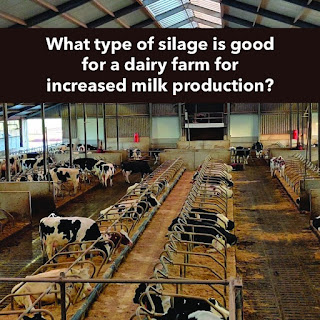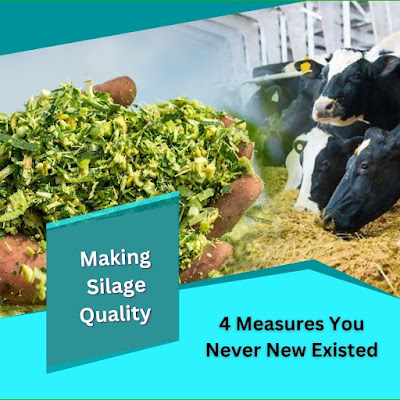What type of silage is good for a dairy farm for increased milk production?
Silage is one of the best food options for animals.
Silage has so many types that depend upon the types of crops used in it and
also the method to preserve it. Due to this reason, farmers became confuse that
which silage they should use to enhance the milk production of the animals.
These different types of silage are also known as hybrid silage. So, in this content,
we will discover different types of silage, and which silage is good for your
animals?
Conventional Hybrid Silage - It is exhibits variation in fiber digestibility and
dry matter. Many seed are combines to evaluate their existing conventional
silage hybrid for fiber digestibility as well as dry matter and they combined
to provide conventional hybrid recommended for dairy farmers. The challenge is
to choose one of the best companies to buy the best conventional hybrid silage.
You should follow up all the silage by monitoring the dry fiber digestibility
and matter digestibility of your silage.
Sugarcane silage
- Sugarcane
silage is also
known as super digestive silage. Due to the high detergent fiber, they boost
the feed intake and improve the ruminal passage of fiber in the animal’s body.
It also provides so much moisture to the animals due to this the liquid needs
of the animals in the dry day got completed. It also has more nutritious value
as compared to other silage options.
Brown Midrib hybrid - This type of hybrid silage has superior fiber
digestibility as well as feeding trials results that use of brown midrib hybrid
silage increases the mild productivity of the animals. The yielding level of
this hybrid silage is less as compared to conventional silage. This happens due
to the high-quality as well as high price seeds used in brown Midrib hybrid
silage. Its economic benefits enhanced when the brown midrib silage is stored
independently and the measurement of elements carefully balanced to enhance the
fiber digestibility of the animals.
Corn silage –
Corn silage naturally contains corn as its prime element. This type
of hybrid silage contains 100% amylopectin starch as compared to the 75%
amylopectin starch in usual dent corn. Feeding trial results are consistent in
the case of corn silage. As per experts, corn silage enhances the capability to
take more feed in animals while other hybrid silages have different
capabilities.
The above four different types of silage vary from each
other due to their elements and Silage
Agro is one of the best suppliers to
deliver high-quality hybrid silage which will definitely benefit in the milk
production of dairy animals.



Comments
Post a Comment